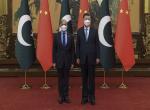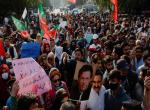The nuclear threat in the subcontinent has led to renewed and redoubled efforts to find a solution to the antagonism between India and Pakistan. One is led to believe that if cross border terrorism ceases, a dialogue can be facilitated between the two countries, yielding perhaps a dividend of long-term peace. Are such visionary hopes rooted in reality?
One may have to go back to the period from late 19th century onwards to grope for answers to this riddle, the period which saw the development of ideas that led to the establishment of Pakistan. At the beginning of this period religion was hardly an indicator of identity for the Muslim community. Important members of the community like Syed Ahmed and later Mohd. Iqbal worked to give a homogeneous identity to the community based on the muslimness of its members who actually had no common outlook and were divided by considerations of language, region and class. Political identity came later, after grant of separate electorates which for the first time recognised Muslims effectively as a constitutional minority even though it had no track record of political activity. Separate electorates was a class concession and by itself did not result in Muslims of India developing a monolithic political identity, because a very large number of the community had remained disenfranchised and thus had no stake in power politics which others sought to play in their name.
However, separate electorates gave a fillip to communitarian discourses which had profound political implications for the future of India. Firstly, the cultural differences among the religions communities were heightened. Secondly, the colonial power emphasised the role of religion by making different sets of laws, applicable to the public and private domains of the communities. The public sphere had common laws whereas in the private domain personal laws, according to the cultural heritage of each religion, were enacted. Leaders among the Muslim elite, whose prime quest was political power, sought to capitalise on the situation, emphasizing identity and numbers, through the appellation of religion. This effort at communalisation was opposed by Nationalist Muslims who sought power for the nation through struggle for independence, rather than for the community. It is interesting to recall that Mohd. Ali Jinnah, known in this period as the Ambassador or Hindu Muslim unity, had been opposed to separate electorates.
For long the efforts towards communalisation did not succeed. Though identified as a community of interests by religion, the Indian Muslims by and large did not consider religion a matter of priority. Their immediate concerns revolved around the region and the locality. The language Urdu was also slow to crystallize into a tangible bond of identity, linking some Indian sections of Muslims of North India because originally it had been the common property of both major religions of India.
The appeal of the nationalist Muslim leaders remained at the ascendant until the quest for political power among the different Muslim groups brought to the fore the philosophical question whether secular nationalism was compatible with Qoranic concepts. Secularism required religion to be kept out of politics but this is inconsistent with Qoranic prescription of regarding the spiritual and the temporal as non-oppositional. The Muslim communalists started harping on the theme that in a secular India, the cultural and religious content of the Muslim identity would come under a severe strain. The Two Nation Theory was invented to bring into a sharper focus the claims about a separate Muslim identity.
Religious communalism of the Muslim elite was, thus, responsible for the creation of Pakistan and after its creation, it became the ideology of Pakistan. The rulers of Pakistan have tried to build up an identity for Pakistan around the ideology of Islam but have failed miserably. The use of the Islamic card by the Establishment has not impressed the Pakistani Polity as the election results have consistently demonstrated. A clear inference can be drawn that for a majority of Pakistanis the questions of identity are not solely governed by the perspectives of Islam.
Yet, Islam and Two Nation Theory remain the corner stones of Pakistan’s policies towards India. These two are the post partition faces of the religious communalism that had led to Pakistan. The earlier antagonism against secular nationalism has been carried forward into a new enmity for India. The sentiment runs deep and wide and its roots go back, as is evident from the above, more than a century back. Its eradication will need time and sustained efforts, mostly within Pakistan itself. Certain fundamentals will need to be scrutinised very closely. Does the expanding ambit of 21st century values suggest separating the domain of religion from the domain of governance? Can a universal human consciousness, based on absolute equality, solidarity and freedom, which is the demand of the day, be attained within restrictions imposed by the normative values of a religion? The answers to these questions hold the key for future Indo Pak relationship, because a Pakistan which continues to keep Islam a key component of its system of governance will continue to conjure up difficulties in dealing with a secular and democratic India.
No group of people can point this out to Pakistan better than the Muslim citizens of India. Without having to compromise on their religious and cultural identities, they have successfully adjusted to the secular ethos and nationalism of the country. Every age has seen a reinterpretation of Islam to conform to the realities of the age. In the 21st century, the requirement increasingly is to separate religion from the State. In the subcontinent, this is assuming paramount importance,
The nuclear threat in the subcontinent has led to renewed and redoubled efforts to find a solution to the antagonism between India and Pakistan. One is led to believe that if cross border terrorism ceases, a dialogue can be facilitated between the two countries, yielding perhaps a dividend of long-term peace. Are such visionary hopes rooted in reality?
One may have to go back to the period from late 19th century onwards to grope for answers to this riddle, the period which saw the development of ideas that led to the establishment of Pakistan. At the beginning of this period religion was hardly an indicator of identity for the Muslim community. Important members of the community like Syed Ahmed and later Mohd. Iqbal worked to give a homogeneous identity to the community based on the muslimness of its members who actually had no common outlook and were divided by considerations of language, region and class. Political identity came later, after grant of separate electorates which for the first time recognised Muslims effectively as a constitutional minority even though it had no track record of political activity. Separate electorates was a class concession and by itself did not result in Muslims of India developing a monolithic political identity, because a very large number of the community had remained disenfranchised and thus had no stake in power politics which others sought to play in their name.
However, separate electorates gave a fillip to communitarian discourses which had profound political implications for the future of India. Firstly, the cultural differences among the religions communities were heightened. Secondly, the colonial power emphasised the role of religion by making different sets of laws, applicable to the public and private domains of the communities. The public sphere had common laws whereas in the private domain personal laws, according to the cultural heritage of each religion, were enacted. Leaders among the Muslim elite, whose prime quest was political power, sought to capitalise on the situation, emphasizing identity and numbers, through the appellation of religion. This effort at communalisation was opposed by Nationalist Muslims who sought power for the nation through struggle for independence, rather than for the community. It is interesting to recall that Mohd. Ali Jinnah, known in this period as the Ambassador or Hindu Muslim unity, had been opposed to separate electorates.
For long the efforts towards communalisation did not succeed. Though identified as a community of interests by religion, the Indian Muslims by and large did not consider religion a matter of priority. Their immediate concerns revolved around the region and the locality. The language Urdu was also slow to crystallize into a tangible bond of identity, linking some Indian sections of Muslims of North India because originally it had been the common property of both major religions of India.
The appeal of the nationalist Muslim leaders remained at the ascendant until the quest for political power among the different Muslim groups brought to the fore the philosophical question whether secular nationalism was compatible with Qoranic concepts. Secularism required religion to be kept out of politics but this is inconsistent with Qoranic prescription of regarding the spiritual and the temporal as non-oppositional. The Muslim communalists started harping on the theme that in a secular India, the cultural and religious content of the Muslim identity would come under a severe strain. The Two Nation Theory was invented to bring into a sharper focus the claims about a separate Muslim identity.
Religious communalism of the Muslim elite was, thus, responsible for the creation of Pakistan and after its creation, it became the ideology of Pakistan. The rulers of Pakistan have tried to build up an identity for Pakistan around the ideology of Islam but have failed miserably. The use of the Islamic card by the Establishment has not impressed the Pakistani Polity as the election results have consistently demonstrated. A clear inference can be drawn that for a majority of Pakistanis the questions of identity are not solely governed by the perspectives of Islam.
Yet, Islam and Two Nation Theory remain the corner stones of Pakistan’s policies towards India. These two are the post partition faces of the religious communalism that had led to Pakistan. The earlier antagonism against secular nationalism has been carried forward into a new enmity for India. The sentiment runs deep and wide and its roots go back, as is evident from the above, more than a century back. Its eradication will need time and sustained efforts, mostly within Pakistan itself. Certain fundamentals will need to be scrutinised very closely. Does the expanding ambit of 21st century values suggest separating the domain of religion from the domain of governance? Can a universal human consciousness, based on absolute equality, solidarity and freedom, which is the demand of the day, be attained within restrictions imposed by the normative values of a religion? The answers to these questions hold the key for future Indo Pak relationship, because a Pakistan which continues to keep Islam a key component of its system of governance will continue to conjure up difficulties in dealing with a secular and democratic India.
No group of people can point this out to Pakistan better than the Muslim citizens of India. Without having to compromise on their religious and cultural identities, they have successfully adjusted to the secular ethos and nationalism of the country. Every age has seen a reinterpretation of Islam to conform to the realities of the age. In the 21st century, the requirement increasingly is to separate religion from the State. In the subcontinent, this is assuming paramount importance,
Article published on dated 25th July 2010
Author is former Chief of RAW








Post new comment